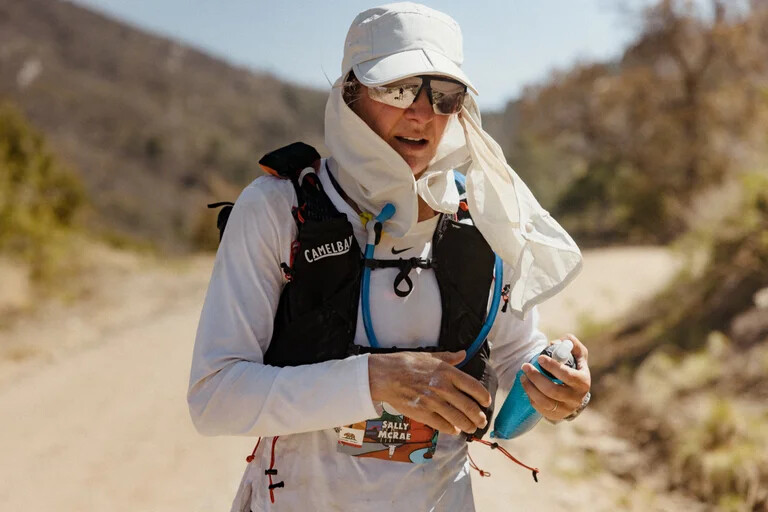Running News Daily
Running News Daily is edited by Bob Anderson. Send your news items to bob@mybestruns.com Advertising opportunities available. Train the Kenyan Way at KATA Kenya and Portugal owned and operated by Bob Anderson. Be sure to catch our movie A Long Run the movie KATA Running Camps and KATA Potato Farms - 31 now open in Kenya! https://kata.ke/
Index to Daily Posts · Sign Up For Updates · Run The World Feed
When you consistently stress the body and the mind, you are changing your chemical makeup. Here’s what the latest science tells us about burnout
Kieran Abbotts is a PhD student at the University of Oregon, studying human physiology. He earned his master’s degree in Metabolism and Exercise Physiology at Colorado State University. The lab where he now works studies exercise and environment and stressors on physiology. In other words, he’s an expert on how the chemicals in the body work during exercise, and what happens when things get out of whack.
“Essentially, there are two kinds of training. There’s functional overreaching, which means you stress the body with hard workouts and long runs. Then you provide adequate time to recover, and you induce adaptations,” Abbotts said. This kind of training is ideal—your body is getting stronger. “You want to be functionally overreaching as an elite athlete—so that you’re making progress and becoming a better runner, but also giving yourself adequate recovery.”
And then there’s non-functional overreaching, which can feel the same to many athletes, but it’s very different. “With non-functional overreaching you’re essentially doing the same thing—big workouts, stressing the body—but not giving yourself enough time to recover. And so you start doing damage.” That damage might take a long time to show itself, Abbots said, but it eventually will.
This might be the most important thing to know about being an athlete at any level. Non-functional overreaching is exactly the same as very healthy training, except without enough rest. And rest is different for everyone, which makes it exceptionally easy to slip from functional overreaching into damaging non-functional overreaching without realizing it. Without adequate rest, the body begins to break down instead of build stronger.
Stress Is Stress

Professional ultrarunner Cat Bradley, 31, living in Hawaii, has experienced fatigue and burnout in various forms, including just after she won Western States in 2017.
Winning a big race is great, but it also means all eyes are on you—the pressure is high to stay on top. “After winning Western States, I took a month off, but I was still running at a high level. And for lack of a better term, I felt like I had a gun to my back,” Bradley said. “I wanted Western States so badly, and after I won, so many things happened and I never shook that gun-to-the-back feeling. After a while, it led to burnout. I had to take a mental break.”
For many athletes, finding success can be the stress that makes non-functional overreaching feel necessary. How can you take an extended break when you’re winning and signing new sponsor contracts?
A second version of burnout for Bradley came when she went through an especially stressful situation outside of running. She was dealing with such extreme daily emotional stress in her personal life that everything else was affected, including running and training. When the body is enduring stress, it doesn’t know (or care) what the cause is. We can’t put our life into silos. If there’s stress in one’s life, everything else needs to be adjusted. It doesn’t matter if that stress is “just work” or illness, or relationships.

When you’re overtraining or chronically overstressed, your body is creating higher levels of “catecholamines,” hormones released by your adrenal glands during times of stress like epinephrine, norepinephrine, or adrenaline. “Having those chronically high levels of overstimulation and not enough recovery, you wind up with a desensitization,” Abbotts said. “Overstimulation also causes decreased levels of plasma cortisol. Cortisol is the stress hormone, and it plays a very important role in your physiology.”
When you’re exercising or stressing the body, cortisol will go up, to help the body deal with the stress. But if you’re constantly requiring lots of cortisol, your body will eventually down-regulate. It will adapt and then you’ll have low levels of cortisol. This means trouble dealing with physical and mental stress.
In February, Bradley experienced her most recent version of burnout, and it happened mid-race. Bradley was running the Tarawera 100-miler in New Zealand. Besides training for such a big race, she was also working full-time and planning and preparing for her wedding, which was just days after the race. On top of everything, travel to the event was incredibly stressful.
“I was in fourth place, I could see third, and at mile 85, I passed out and hit my head on a rock,” Bradley said. “We can talk about the reasons that I fainted, but I really think my brain just shut down—it was too much.”
For Bradley, reaching burnout has a lot more to do with outside stressors than the actual running. But now she’s aware of that—she continues to work on not reaching the “gun-to-the-back” feeling. The need to please others. The fear of losing fitness in order to take care of her body. It’s an ongoing process, but an important one.
Overdoing Is the American Way
Professional ultrarunner Sally McRae said, based on her observations, Americans are really bad at taking time off. “I’ve traveled the world and Americans are really bad at resting,” she said. “It’s part of our work system. You go anywhere in Europe and everyone takes a month-long holiday. You have a kid and you take a year off. We’re not conditioned like that in America. It’s like you get one week and then after you work a decade, you get two weeks of vacation.”
For McRae, avoiding burnout and overtraining has a lot to do with creating a life that’s sustainable. She started working when she was 15-years-old, so she realized earlier than most that life couldn’t just be working as hard as possible to count down to retirement.
“Perspective is massive when it comes to burnout. My goal every year is to find the wonder and the beauty and the joy in what I do. Because it’s my job, but it’s also my life,” McRae said. “And I really believe we’re supposed to rest—it should be a normal part of our life. Whether that’s taking a vacation or taking an off-season. I take a two-month offseason and I have for a long time.”
One of the most important parts about rest and not overstressing the body is that everyone is different. An overstressed body can lead to hormonal imbalances, which in turn affects everything.
“When you’re overtraining, you tend to get mood changes and have trouble sleeping,” Abbotts said. “Two of the big things that stand out are, you’re exhausted but you can’t sleep. And the other is irritability—mood swings, and depression.” When you get to the point that you’ve overstressed your body for so long that the chemicals are changing, pretty much everything starts falling apart.
And even though everyone is different, you’d never know that from looking at social media. “I know social media makes it seem like ultrarunners are running 40 miles a day, doing a 100-mile race every other weekend,” McRae said. “And that’s insane. You’ve got to be in touch with yourself. It’s very different to wake up and feel sore or tired, but if you wake up and feel like you have no joy in the thing you’re doing, you need a real break from it.”
How Can the Running Community Do Better?
Elite ultrarunner and running coach Sandi Nypaver wants runners to get more in touch with how they’re feeling and less concerned about numbers or what anyone else is doing.
“I have to have honest talks with people I’m coaching. I need them to feel like they can tell me how they feel, because sometimes they think they have to stick to the training plan for the week no matter what,” she said. “But the plan is never set in stone. It’s meant to be adjusted based on how you’re feeling. Some weeks we might feel great and not need to change anything, while other weeks we might have to totally crash the plan and do something else.”
It’s easy to judge ourselves against everyone else, especially when results and reactions are so public and available.
“It’s easy to say, ‘if that person only took three days off after a big race, and now they’re already back to training, that must be what you’re supposed to do,’” she said. “But even at the highest level, training is different for everyone. Resting is different for everyone.”
“Something that’s really, really hard for many runners to understand is that once you’re not sore anymore, that you’re still not recovered,” Nypaver said. “A lot of research says that things are still going on in your body for up to four weeks after, for certain races, depending on the distance.”
Sometimes it’s difficult to be aware of subtle signs when the soreness is gone. “Convincing people that they need to chill out for a while, even past the soreness, can be really difficult.” But after a huge effort, and before the next, people rarely end up saying things like, “I really wish I hadn’t rested so thoroughly.” Part of it is actually having a recovery plan. Putting rest days on the calendar, focusing on foam rolling and mobility on days that you’re not “doing.”
“And, actually just relaxing. Taking it easy. It’s not just a running model, we live in a culture where we’re always being asked to do more,” Nypaver said. “I wish instead of always thinking about doing more, we’d focus on how we want to be more. A lot of us want to be more relaxed and less stressed and happier and enjoy our lives. We need to put our attention on that instead of trying to do so much. It’s something I struggle with all the time.”
We don’t get validation for resting, relaxing, and being present because there’s no tangible thing to show for it. There’s no “be really calm often” challenge on Strava. But the bigger rewards are great. You just have to trade in immediate dopamine hits for a much more balanced, happier life.
Simple, right?
“One thing I’m doing, and asking my athletes to do, is to write down your intentions,” Nypaver said. “One of my intentions is to chill out more this summer and enjoy it. I grew up thinking it’s all about running, and I have to go all-in on running. But having other outlets, other things that I like to do, is so important.”
When you’ve reached burnout—an extended period of non-functional overreaching, prolonged rest is the only way to let the body fix itself.
“Once you are overtrained, you need to stop training,” Abbotts said. “It’s just kind of the bottom line. Maybe some people can get away with greatly reducing their training load, but most of the time you need to stop. You need an extended amount of time off.”
There’s nothing glamorous about rest. There’s no prize money in relaxing. But it’s the absolute key ingredient in extended performance, and in a much healthier, happier life.
by Outside Online
Login to leave a comment




